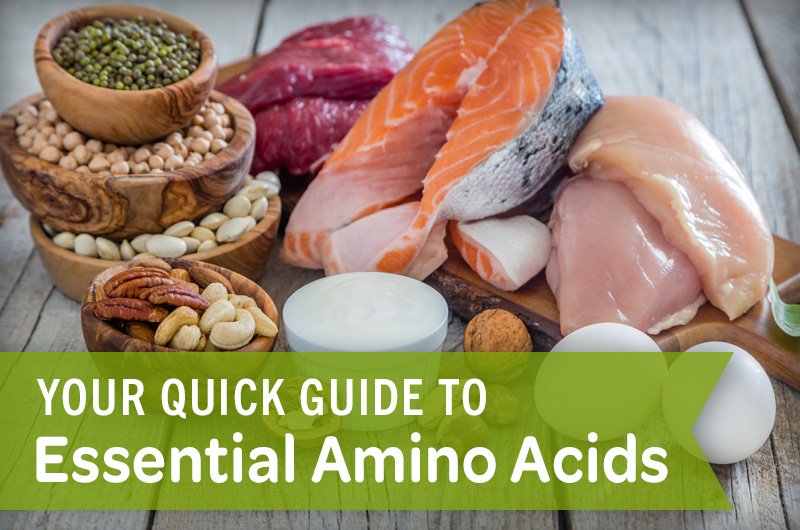Essential amino acids: these nine protein-building blocks help humans make proteins, hormones, and neurotransmitters. They also help repair tissue and absorb nutrients. For optimal mental and physical health, you need to get all nine in regularly!

Which amino acids are “essential”?
While the human body dismantles all the proteins we eat and remodels them into the proteins our body requires, we can’t make the essential amino acids ourselves. As a result, we have to get them from our diets (unlike the other 11 amino acids, which we can build).
The nine essential amino acids are: 1) histidine, 2) isoleucine, 3) leucine, 4) lysine, 5) methionine, 6) phenylalanine, 7) threonine, 9) tryptophan, and 9) valine. They are an “essential” part of our everyday diets, as we are incapable of making them.
The other eleven amino acids are: alanine, arginine, asparagine, aspartic acid, cysteine, glutamic acid, glutamine, glycine, proline, serine, and tyrosine. If we didn’t already get them from our diet, we can build them. In certain circumstances, like when fighting powerful diseases like cancer, some of these nonessential amino acids (most commonly arginine and/or glutamine) may become conditionally essential. In other words, your body has a lot going on and therefore needs more building blocks from the diet for support and muscle repair.
What foods are they found in?

The most concentrated sources of essential amino acids are generally animal-based proteins like meat, seafood, poultry, eggs, and dairy products, but you can still get all nine essential amino acids from plant-based foods.
Any food that already has every one of the nine essential amino acids rolled into one neat, single-ingredient package is referred to as a “complete” protein. Plant-based complete proteins include soy, buckwheat, and quinoa.

Apart from eating complete proteins, you can also source all the amino acids you need from eating a variety of incomplete proteins like beans, nuts, seeds, vegetables, and whole grains. However, protein from vegan sources may not be as readily available as animal proteins, so vegans may need to compensate by increasing their daily protein intake overall.
Who is the most at risk for suboptimal essential amino acid levels?
Generally, the more restricted your diet is in terms of food groups, the more at risk you are for nutrient deficiencies. In the case of essential amino acids, vegetarians and vegans are the most likely to get an insufficient variety and/or quantity of amino acids from their daily diet. If you’re vegan, a good essential amino acid to focus on getting enough of is lysine. The best dietary sources include legumes and wheat gluten.

Dietary decisions aside, activity level can also increase your need for “aminos”. If you regularly partake in intense exercise that gets you sore, your body needs a higher intake of essential amino acids (and protein in general) than someone who is less active. Many athletes supplement BCAAs (Branched-Chain Amino Acids) in an attempt to ensure their muscles have a plethora of available building blocks for repair and synthesis. BCAAs usually include three essential amino acids: leucine, isoleucine and valine, and are called “branched-chain” because of their chemical structure.
How can you avoid missing any one of these nine aminos?
- Eat a variety of protein-containing foods.
- Use supplements to fill gaps in your diet or compensate for increased demand for aminos.
If you are interested in supplementing amino acids, take a peak at the links below:
- Shop our selection of aminos (BCAAs etc)
- Shop vegan aminos
- Shop vegan sports and fitness products containing lysine
